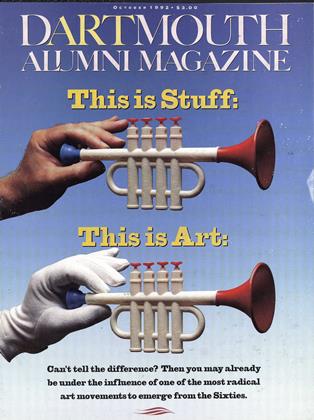Music Professor Robert Walser: What MAKES MUSIC STAR Paul Slmon "POSTMODERN"?
I HAVE IN MIND Simon's Graceland album, although some of his other work takes up issues and exemplifies tactics that have been called postmodern. A song like "Boy in the Bubble" grapples with the contradictions of our technology and media-saturated environment: "lasers in the jungle," and "the way the camera follows us in slo-mo / the way we look to us all." More important, perhaps, is the fact that Simon's voice rides on top of the complex, joyous, rocking beat of a group of South African pop musicians. Simon's album seems to promote cultural interaction, the free exchange of music and perspectives across cultural boundaries. Yet, on the other hand, he was roundly criticized for using these musicians rather than collaborating with them; also, in the process of producing this album, he broke an artists' boycott of South Africa, intended as a statement against apartheid. Thus Graceland illustrates the thorny politics of inter-cultural art, particularly in a post-war, post-colonial, commercial, and media environraent. raent. The album appears to have helped bring the injustice of apartheid to the attention of many Americans. Yet there are disturbing stories about Simon's appropriation of various music, including that of Los Lobos. An African friend of mine admitted that many South African musicians became famous as a result of working with Simon, but he pointed out that "famous" here means "known to the West"; these musicians were already famous in Africa. It is easy to see Simon's placement of introspective yuppie lyrics over pre-existing music as another example of Western arrogance and exploitation of exotic Others, at the same time that one might enjoy the music and respect its political effects. So both the songs themselves and the process of their production necessarily raise a variety of issues that are often called postmodern.
Last summer Music 1, a courseteam-taught by musk professors TedLevin and Robert Walser, wasprovocatively advertised in TheDartmouth with a series of questions, including: "What makesPrince, Paul Simon, and LaurieAnderson 'postmodern
PaulSimon
Robert Walser
 View Full Issue
View Full Issue
More From This Issue
-
 Feature
FeatureTHE LISTENING DEAN
October 1992 -
 Cover Story
Cover StoryThe Stuff of Art
October 1992 By LEE MICHAELIDES -
 Feature
FeatureThe Underground Curriculum
October 1992 By Tim Brookes -
 Article
ArticleThe Lost Season
October 1992 By JIM COLLINS '84 -
 Article
ArticleDid Something Happen in 1492?
October 1992 By William Spengemann -
 Article
ArticleDr. Wheelock's Journal
October 1992 By "E. Wheelock"
Article
-
 Article
ArticleCollege Club Constitution
August, 1912 -
 Article
ArticleAlumni Fund
May 1945 -
 Article
ArticleThree New York Alumni Get First Annual Service Awards
June 1955 -
 Article
ArticleDavid F. Squire '47 Heads Alumni Association
JULY 1971 -
 Article
ArticleDR. WHEELOCK'S JOURNAL
OCTOBER 1989 -
 Article
ArticleSPORTS SCHEDULE
JANUARY 1964 By DAVE ORR '57

